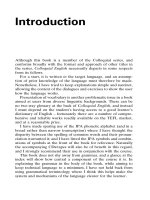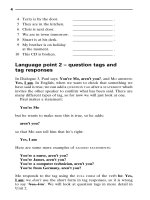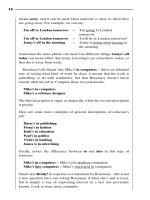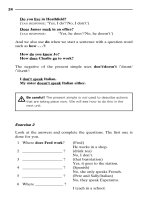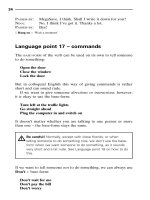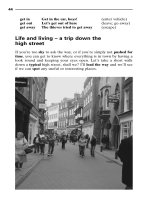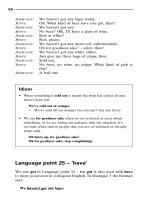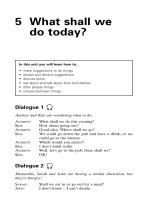A complete English language course part 6
Bạn đang xem bản rút gọn của tài liệu. Xem và tải ngay bản đầy đủ của tài liệu tại đây (84.88 KB, 10 trang )
P
ASSER
-
BY
: MegaSave, I think. Shall I write it down for you?
N
INA
: No, I think I’ve got it. Thanks a lot.
P
ASSER
-
BY
: Bye!
1 Hang on = ‘Wait a moment’
Language point 17 – commands
The
BASE
-
FORM
of the verb can be used on its own to tell someone
to do something:
Open the door
Close the window
Lock the door
But in colloquial English this way of giving commands is rather
short and can sound rude.
If we want to give someone directions or instructions, however,
it is okay to use the base-form:
Turn left at the traffic lights
Go straight ahead
Plug the computer in and switch on
It doesn’t matter whether you are talking to one person or more
than one – the base-form stays the same.
If we want to tell someone not to do something, we can always use
Don’t + base-form:
Don’t wait for me
Don’t pay the bill
Don’t worry
34
Be careful! Normally, except with close friends, or when
telling someone to do something nice, we don’t use the base-
form when we want someone to do something, as it sounds
very short and a bit rude. See Language point 18 on how to do
this.
ƽ
Exercise 1
Say where you think you would find the following orders. Write the
correct letters in the blanks.
1 library _j_ a Don’t annoy the teacher!
2 park ___ b Don’t smoke near the patients!
3 bar ___ c Don’t forget to turn off your
mobile!
4 restaurant ___ d Don’t forget your passport!
5 hospital ___ e Don’t forget the present!
6 classroom ___ f Don’t drink too much!
7 airport ___ g Don’t complain about the food!
8 swimming pool ___ h Don’t pick the flowers!
9 cinema ___ i Don’t dive!
10 birthday party ___ j Don’t make too much noise!
Language point 18 – asking people
to do things
Instead of giving commands (Language point 17), we usually ask
people to do things for us. To do this, we put an
AUXILIARY
before
the base-form: Could you . . . ? Or Would you . . . ?, and at the end
of the sentence we can add please:
Could you open the window (please)?
Would you close the door (please)?
Or we can use the auxiliary as a
TAG
, and start with the base-form:
Open the door, could you?
Close the door, would you?
Don’t forget the auxiliary tag here – otherwise it will sound rude.
Exercise 2
Correct these instructions and requests. Be careful! One of them
doesn’t need correcting.
1 Slip not on the ice! ________________________
2 Wait please here a minute. ________________________
1111
2
3
4
5
6
7
8
9
10
11
1211
13
14
15
16
17
18
19
20
21
22
23
24
25
26
27
28
29
30
31
32
33
34
35
36
37
38
39
40
41
4211
35
3 Be not rude to customers! ________________________
4 Do this work now, please. ________________________
5 Don’t please throw litter. ________________________
6 Open the door, you could? ________________________
7 You could close the door, ________________________
please?
8 Do wait not for me. ________________________
Dialogue 3
Terry is looking for the bus station.
T
ERRY
: Excuse me, am I going the right way for the bus
station?
P
ASSER
-
BY
: Let’s see now . . . yes – keep going down here till you
reach the traffic lights, then turn right and you’ll see
the bus station at the end of the road.
T
ERRY
: Thanks a lot.
P
ASSER
-
BY
: Quite all right.
Language point 19 – genitive
In Dialogue 3 the passer-by says:
the end of the road not ‘the road’s end
’
But we say
John’s book not ‘the book of John
’
So we have two
GENITIVE
constructions in English:
POSSESSIVE
: John’s book (X’s Y)
OF
-
PHRASE
: the end of the road (the Y of X)
36
Idiom
We use the phrase Let’s see now to signal to the person we’re talking
to that we need a moment to think.
How do we decide which to use?
We prefer the possessive (X’s Y):
when X is a person: Laura’s exam results
when Y belongs to X: Gerry’s hand, Fred’s car
but otherwise we generally prefer of (the Y of X)
the door of the school
the middle of the night
the end of the war
Exercise 3
Decide which of the two options is correct for each phrase.
1 John’s book The book of John
2 The road’s end The end of the road
3 My sister’s clothes The clothes of my sister
4 The house’s top The top of the house
5 The week’s end The end of the week
6 Alice’s new car The new car of Alice
7 The pool’s bottom The bottom of the pool
8 The night’s middle The middle of the night
9 My brother’s house The house of my brother
10 Our cat’s ears The ears of our cat
Dialogue 4
Sasha is lost – she’s looking for the art gallery. In the end, a passer-
by notices her.
P
ASSER
-
BY
: You look lost – can I help?
S
ASHA
: Oh thank you – yes, I am a bit lost, I’m afraid. I’m
trying to find the art gallery.
P
ASSER
-
BY
: That’s miles away! No wonder you look lost! Get the
22 bus from the corner here, and get off at Southwold
Terrace. Then turn left into York Avenue, and carry
on until you get to the gallery.
S
ASHA
: Could you write it down for me? I’m bound to get lost
again otherwise.
1111
2
3
4
5
6
7
8
9
10
11
1211
13
14
15
16
17
18
19
20
21
22
23
24
25
26
27
28
29
30
31
32
33
34
35
36
37
38
39
40
41
4211
37
P
ASSER
-
BY
: Certainly . . . [writes it down for Sasha]
. . . there you are.
S
ASHA
: Thank you for your help.
P
ASSER
-
BY
: Not at all. Enjoy the art gallery!
S
ASHA
: I will. Bye!
P
ASSER
-
BY
: Bye!
38
First
left
Second
left
Straight
ahead
Second
right
First
right
Idioms
– no wonder means ‘I’m not surprised that . . .’
– I’m bound to . . . means ‘I’m certain to . . .’ or ‘It’s certain that
I’ll . . .’
– We use There you are when we give someone something, or when
we finish doing something for them.
– otherwise means ‘if not’:
Hurry up, otherwise we’ll miss the bus.
= ‘Hurry up – if
we don’t hurry up, we’ll miss the bus.’

